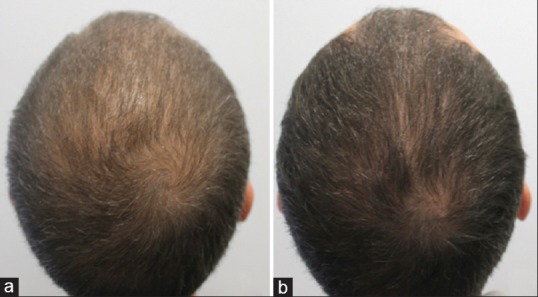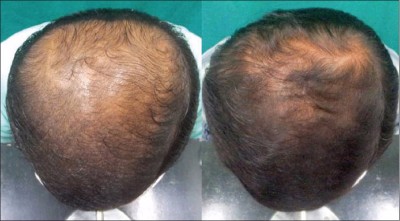2022 update: Spanish researchers find mesotherapy with dutasteride to be effective in male and female hair loss in real clinical practice. Side effects related to the treatment were mild.
2021 update: A team of scientists (largely from Spain and Brazil) discuss the side effect of frontal edema after dutasteride mesotherapy treatment.
2019 update: A study from Mexico concluded that dutasteride injections via mesotherapy were successful in treating androgenetic alopecia.
The single best currently available medication to treat hair loss is enlarged prostate (BPH) reduction drug Dutasteride. This product is basically Finasteride (Propecia or Proscar) on steroids. I have covered Dutasteride and its brand name Avodart numerous times on this blog in the past. For many lucky people, this drug represents an already available cure for hair loss.
While Dutasteride is not yet approved for treating hair loss in the US or Europe, it is approved for that purpose in Japan and South Korea. Nevertheless, many US doctors are willing to prescribe it for hair growth purposes. To get an idea of how effective this medication can be, you can read the hundreds of mostly positive comments in this blog’s Dutasteride reviews page.
Side Effect Fears from Oral Dutasteride
I tried Dutasteride pills many years ago shortly after they first came out. However, I got paranoid about the potential side effects, and stopped after several months of experimentation. However, based on the above mentioned numerous positive testimonials on this blog, I restarted the drug last year. I take the recommended 0.5 mg per day dosage every second day, rather than daily. Perhaps one day I can use topical Dutasteride. Or more likely, topical finasteride.
As far as my hair loss goes, Dutasteride has been a miracle. Instead of shedding 100 plus hairs after my daily shower, I now shed 10-20. Further progression of my baldness has ceased. As far as regrowth goes, I have definitely seen some in my crown, but not much elsewhere on my scalp.
However, despite this very successful outcome, I still have second thoughts about taking this drug. Its long term side effects are certainly going to be worse than those from Finasteride, for the unlucky who get them. Besides inhibiting a significantly higher portion of dihydrotestosterone (DHT) in comparison to Finasteride, Dutasteride inhibits all three isoforms of 5α-reductase (i.e., types I, II, and III). Finasteride only inhibits types II and III.
Hopefully my fears are overblown, and most studies from around the world seem to suggest so. Dutasteride is largely well tolerated per most research findings and very few people get major long-term side effects upon cessation of the drug. However, since the drug was only approved to treat enlarged prostates in 2001, there are very few studies out there that follow people who have taken the drug for 10 plus years.
Topical Dreams
For many years, I have been hoping that a topical gel or cream or liquid version of Dutasteride would be released by a reputable company. Then I could take daily and higher doses with fewer chances of side effects. In general, topical versions of drugs seem to result in fewer side effects than oral versions, although this is not set in stone. In some cases topical products still get into the bloodstream. The chemical ingredient then shows up in various human tissues and organs in similar concentrations to its oral counterpart. Nevertheless, topical is always preferable to oral if both are equally effective in my opinion.
Local compounding pharmacies can often also make topical Finasteride or Dutasteride for you, but prices are very high. Moreover, I would be more comfortable with a well known corporation making the product so that I know that the topical compound and delivery method are reliable and tested throughly.
Mesotherapy with Dutasteride in Treating Androgenetic Alopecia
Last week, I got a great surprise when I was browsing through PubMed for the keyword “Dutasteride”.
It seems like a new way of applying Dutasteride through mesotherapy scalp injections seems to give great results with no side effects. including intradermal injections, known as mesotherapy. Mesotherapy (also called intradermotherapy) is a non-surgical procedure consisting of multiple intradermal injections of pharmacological substances in small doses.
This new potentially groundbreaking study comes from Spain. Moreover, the best part of the story is that:
“Laboratory tests showed no differences between serum hormone levels before and after treatment”.
This means that unlike oral Dutasteride, this treatment method does not alter your hormones beyond localized scalp DHT reduction. The scientists involved treated six patients (five male, one female) and all got good results. They posted one before and after photo:

The second best part of this story is that the treatment was only done once every three months. In the past, three other groups had tried similar mesotherapy treatments, but all involved far more frequent treatments. It would be expensive and annoying to get injected every couple of weeks, but every three months is very tolerable.
Dr. David Saceda-Corralo
I contacted one of the study’s lead authors, Dr. David Saceda-Corralo. I wanted to see if he had photos of any of the other five patients and to ask whether this treatment is available in the US. Unfortunately, while he has other photos, those patients have not given him permission to share them publicly. He did say that he may share other relevant photos on his Instagram account.
According to Dr. Saceda-Corralo, this treatment is not easy to get in the US. However, it is getting increasingly popular in Spain and the rest of Europe.
